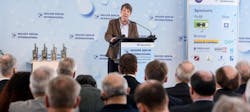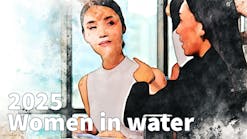Jordan’s biosolids industry is lacking behind and the country would welcome German industry expertise and input, the Minister for Water and Irrigation said today.
Speaking at the opening of the Wasser Berlin International event in Germany’s capital city, H.E. Dr Hazim El-Naser, minister for water and irrigation in Jordan spoke openly about the need for change in his country’s water and wastewater industries.
He said that by 2030, demand for water is expected to double to 130 million cubic metres and that “clean water production” is one of the most pressing needs of the Middle Eastern country.
On the topic of wastewater, he said there needs to be upgrades to treatment capacity but that biosolids and sludge management is where Jordan is “lacking behind”.
Ahead of a draft law on hydraulic fracturing expected to be finalised shortly by the German Government, Dr Barbara Hendricks, federal minister for the environment, nature conservation, building and nuclear safety said during her keynote address that “fracking will not take place if harmful to the environment”.
Jörg Simon, CEO Berlin Wassergroup said that the water industry has to face major challenges in the future, including fracking.
Wasser Berlin International 2015 expects 20,000 people from 26 countries to visit over 550 exhibitors during the course of the four-day show.
Flood management is a new topic to the event this year, including a new exhibitor section and conference.
Speaking about flooding during her keynote speech, Dr Hendricks said that over a 20 year period, Germany experienced seven major floods on a scale that were only expected once a decade.
The environment minster added that to date, floods have caused billions of euros worth of damage and that a “national flood programme” is soon to be announced by the government.
###
Read more
Reuse steps up in water poor Jordan Prior to the recent protests in Amman, USAID awarded a US$28 million, task order for a water reuse and environmental conservation project in Jordan. Tom Freyberg speaks to senior engineer George Harris about the project and challenges of changing wastewater perceptions across the Middle East…





